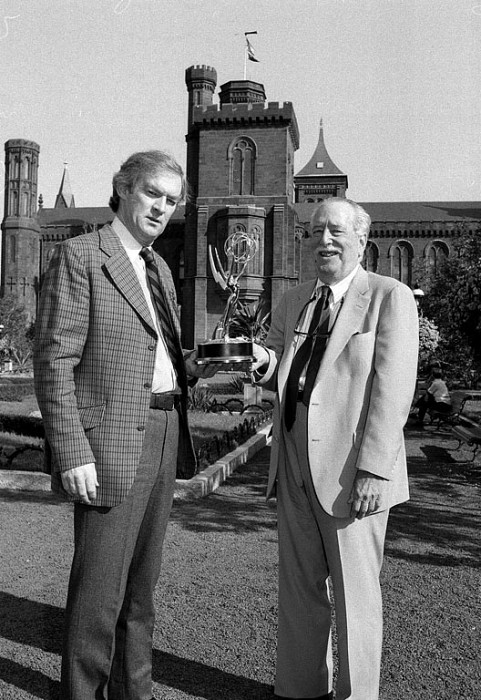In Memoriam: Adrian Malone
“Smithsonian World” was an ambitious television series covering the arts, sciences and humanities, hosted by David McCullough and coproduced for public television by WETA in Washington, D.C., and the Office of Telecommunications of the Smithsonian Institution from 1984 to 1990. With its encyclopedic array of topics, “Smithsonian World” covered subjects ranging from the Panama Canal to Anne Morrow Lindbergh to a rare Sumatran tiger. In 1994, cable’s Learning Channel started airing ’80s episodes under the umbrella “Smithsonian Treasures.”
Elizabeth Smith Brownstein, who was director of research for “Smithsonian World,” shares her memories of Adrian Malone, the television producer who Secretary Robert McCormick Adams called a genius who brought distinction to the Institution in everything he did.
Adrian Malone February 3, 1937 – March 13, 2015
Adrian Malone arrived at the Smithsonian in January 1986 to take over as executive producer of “Smithsonian World” at the beginning of its third award-winning season. The Institution’s first venture in prime time television had already received critical acclaim and was called the Christian Science Monitor “the most challenging series since Bronowki’s “Ascent of Man,” which Malone created at the BBC in the 1970s.According to the New York Times, he was “arguably the most important television producer of his generation” and his reputation preceded him to Washington, where the “Smithsonian World” production team awaited his appearance with intense curiosity and some trepidation.

Adrian Malone, the creative inspiration behind the series The Ascent of Man, Smithsonian World The Age of Uncertainty and Cosmos, photographed in 1977. Photograph: Frank Herrmann/Times Newspapers Ltd
Malone first changed the program from the magazine format it had used for its first two seasons; henceforth each program would be an in-depth look at a single subject. He preferred to define the Smithsonian Institution as the “face of the nation’s culture, not the nation’s attic.” Over the course of three seasons, Malone oversaw the production of 18 ambitious programs, including:
- “Islam,” which was ahead of its time in offering perspective on issues surrounding this then-little understood religion;
- “The Wyeths: A Father And His Family,” about which David McCullough, series host and narrator, said later, “If I had done nothing else ever on television except this program, I think my time would been worthwhile;”
- “Tales of the Human Dawn”, a study of human evolution, which the New York Daily News called “a mind-boggling hour…a stunning, intelligently conceived program, eclectic in its approach…the hour blows away the cobwebs from looking at so much brainless TV and puts a demand on the viewer.”
Of “Smithsonian World’s” final program, “The Doors of Perception,” the Columbus, Ohio Dispatch wrote: “The series held its own among louder, more intense shows by the sheer force of the human curiosity it so eloquently celebrated…What a noble legacy from a series that looked beyond….” The series won more than 50 awards, including three Emmys and two Prime Time Emmys for “Outstanding Informational Series.” It lives on as a teaching tool in schools.
Malone epitomized the ideal that Edward R. Murrow described in his famous statement in 1958 that television…”can teach, it can illuminate, yes and even it can inspire. But it can do so only to the extent that humans are determined to use it to those ends. Otherwise, it’s nothing but wires and lights in a box.”
Sandy Bradley, senior producer throughout the series, Paul Johnson, then the head of the Office of Telecommunications, and Program Assistant Kit Caplan recall Malone as demanding and exacting in his insistence on excellence but also approachable, supportive and kind. He went on to create a prodigious record of achievement with programs such as “Age of Uncertaintyt” with economist John Kenneth Galbraith, “Cosmos” with Carl Sagan and “Millennium: Tribal Wisdom and the Modern World,” but perhaps his most important legacy is his ability to insist upon and elicit the very best from those who worked for and learned from him.
Malone was born Feb. 3, 1937 and died March 13 at age 78 in England. He leaves a daughter, two sons, and several grandchildren.

“Smithsonian World” executive producer Adrian Malone (l.) and SI television consultant Tom Wolf proudly display the Emmy Award for Outstanding Informational Series, which the series won at the September 12th Emmy Awards. ‘Smithsonian World’ also won an Emmy in 1985 for Outstanding Informational, Cultural or Historical Programming. (Photo by Dane Penland, as featured in The Torch, November 1987)
Posted: 26 May 2015
- Categories:




[…] Read more about the legendary producer Adrian Malone, who died in 2015, in this reminiscence by Elizabeth Smith Brownstein >> […]